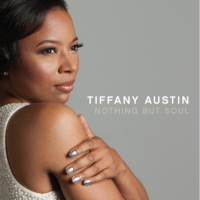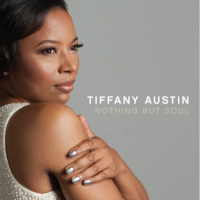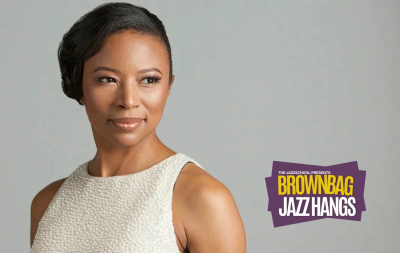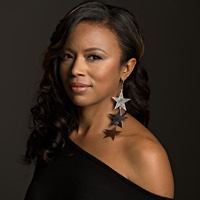Home » Jazz Musicians » Tiffany Austin
Tiffany Austin
Tiffany Austin had sung on three continents—around her native Los Angeles while attending college, then for a year in London, and eventually for five and a half years in Tokyo—before setting music aside upon being accepted in 2009 at the University of California's Boalt School of Law in Berkeley. Yet the itch left by the music bug never went away, and a year into her law studies, she enrolled on a full scholarship at the nearby Jazzschool (now the California Jazz Conservatory), where her refreshingly original singing style attracted the attention of such innovative young San Francisco Bay Area bandleaders as bassist Marcus Shelby and tenor saxophonist Howard Wiley. Although she did earn a Juris Doctorate in 2012, while her peers were taking the bar exam Austin decided instead to devote her life to her first love.
Regarded as one of the fastest rising jazz singers in Northern California with a tradition¬rooted yet thoroughly modern style, Austin is now stepping further forward with her debut CD, Nothing But Soul,on her own Con Alma Music label. The album is the outgrowth of a November 2013 SFJAZZ “Hotplate” concert for which she reimagined compositions by the great American songwriter Hoagy Carmichael. For the recording, which was produced by saxophonist Howard Wiley, Tiffany was joined by bassist Ron Belcher, drummer Sly Randolph, and Glen Pearson, one of the busiest and perhaps most versatile pianists in the Bay Area.
Nothing But Soul is made up of six Carmichael tunes—“Baltimore Oriole,” 'Stardust,” “Skylark,” “I Get Along Without You Very Well,” “Georgia on My Mind,” and “Sing Me a Swing Song (And Let Me Dance)”—as well as two non¬Carmichael numbers that he recorded as a vocalist: Henry Sullivan and Harry Ruskin’s “I May Be Wrong (But I Think You’re Wonderful)”; Johnny Cash’s “I Walk the Line”; and “Tete a Tete,” a wordless a cappella duet by Austin and Wiley based on the chord changes of Charlie Parker’s “Confirmation.”
Austin created three of the arrangements heard on Nothing But Soul,basing “Baltimore Oriole” on Lorez Alexandria's version but replacing Latin¬tinged rhythms of the original recording with a soul¬jazz boogaloo and turning “I Walk the Line” into a barrelhouse blues shuffle. Wiley arranged three, giving “Stardust,” usually performed as a ballad, a two¬beat swing lift in tempo; treating “Skylark” to a somewhat off¬kilter rhythmic twist that he characterizes as cross between Pharoah Sanders and Q¬Tip (“She’s sitting on top of the pillow real nice,” the saxophonist says); and reconstructing “Georgia” with a J Dilla¬-like hip¬hop groove and vocal harmonies by both Wiley and Austin.
Read moreTags
Tiffany Austin: Unbroken

by Walter Atkins
Unbroken (Con Alma Music, 2018) is the follow- up to Tiffany Austin's vibrant debut album Nothing But Soul (Con Alma Music, 2015). Austin beautifully expresses her personal views and positive responses to the past and current atrocities committed against African American citizens in the United States. According to Austin, the title Unbroken “is a celebration of the resilience of the African American spirit and musical lineage. I want the album to be a balm for people who feel ...
Continue ReadingTiffany Austin: Unbroken

by Walter Atkins
Rising San Francisco Bay Area jazz vocalist Tiffany Austin held an engaging album release party for her sophomore effort, Unbroken (Con Alma Music, 2018) at the comfortable Piedmont Piano Company in Oakland's Uptown neighborhood. As the NBA Golden State Warriors battled the Houston Rockets in a crucial semi finals game a few miles way at Oracle Arena, Austin treated her lucky guests to passionate music along with good food & wine in a unique musical setting. It's also home to ...
Continue ReadingTiffany Austin: Unbroken

by C. Michael Bailey
One of the greatest talents of the great talent, vocalist Betty Carter, was her ability to sing in different voice personalities. She could purr the purest ballad, scat the fastest bop run, and dig the deepest in the blue notes. Carter's legacy has been wanting for a new talent to bestow its mantle...and that talent is Tiffany Austin. Add to this talent the vision for selecting an integrating theme to the repertoire and Unbroken, the sophomore release after 2015's Nothing ...
Continue ReadingTiffany Austin: Nothing But Soul

by Dan Bilawsky
While countless artists have covered the music of Hoagy Carmichael, album-length tributes from a single artist saluting his work aren't all that common; Carmichael salutes that reshape some of his most beloved compositions are, understandably, even more scarce, as there are heavy risks involved in toying with the nature of his treasured songs. Tiffany Austin, however, isn't afraid of expressing her love of Carmichael's work in her own sweetly soulful way. On Nothing But Soul, this Berkeley-based ...
Continue ReadingTiffany Austin at SFJAZZ

by Walter Atkins
Tiffany Austin SFJAZZ, Joe Henderson Lab CD Release Party-Nothing But Soul (Con Alma Music) San Francisco CA June 12, 2015 Vocalist Tiffany Austin and her skilled band took the stage at SFJAZZ's Joe Henderson Lab to celebrate her debut Nothing But Soul (Con Alma Music). With an introduction by tenor saxophonist Howard Wiley, Austin walked out in a beaded, sleeveless full-length gown. The ivory toned, form-fitting dress created a classic look for her album ...
Continue ReadingVocalist Tiffany Austin Celebrates The Resilient Spirit Of African-American Culture On Her Sophomore Recording "Unbroken," Set For June 1 Release

Source:
Terri Hinte Publicity
With the June 1st release of Unbroken, on her Con Alma Music imprint, Tiffany Austin further solidifies her standing as one of the leading vocalists on the current international jazz scene. Austin was propelled onto the national stage in 2016 when her debut recording, Nothing But Soul, received rave reviews from media outlets such as DownBeat and NPR’s Fresh Air as well as airplay on jazz radio stations across the U.S. With her sophomore CD Unbroken, Austin has raised her ...
read more
Vocalist Tiffany Austin Announces Summer Shows In NYC, San Francisco, San Jose

Source:
Terri Hinte Publicity
Raves began pouring in upon the release of jazz singer Tiffany Austin’s debut CD, Nothing But Soul, on her own Con Alma Music label last summer. Yoshi Kato gave the disc four stars in his glowing DownBeat review. Kevin Whitehead called her “a vocalist to keep an ear on” during his radio review for NPR’s Fresh Air. “She’s magnetic on stage, always finding fresh insights on the American songbook, and yet always in touch with the singers and traditions who’ve ...
read more
Bay Area Vocalist Tiffany Austin Debuts June 2 With "Nothing But Soul," On Her Con Alma Music Label

Source:
Terri Hinte Publicity
One of the fastest rising jazz singers in Northern California, with a tradition-rooted yet thoroughly modern style, Tiffany Austin brings a wealth of experience to her debut CD Nothing But Soul, scheduled for June 2 release by her Con Alma Music label. The Los Angeles native, currently based in Berkeley, worked with producer Howard Wiley to adapt and expand on her November 2013 SFJAZZ “Hotplate” concert for which she reimagined compositions by the great American songwriter Hoagy Carmichael. Nothing But ...
read more
"Tiffany breathes new life into every song she sings, creating that delicate balance between a profound respect for tradition and a fearless sense of soul. ... A brilliant star on the rise." - Rebeca Mauleón - Pianist/Composer/Author and SFJAZZ Director of Education
"When I first heard Tiffany Austin sing, I was truly stunned by her grace, sophistication, and talent. Her tiny stature stood out in great contrast to the emotional depth, strength, and power of her voice.
Primary Instrument
Vocals
Willing to teach
Beginner to advanced
Credentials/Background
Tiffany Austin teaches private vocal lessons for students of all ages in her Berkeley CA studio, and at the East Bay Center for the Performing Arts in Richmond, CA. In addition to private voice lessons, Tiffany teaches music theory/ear training, and is a choir leader and lecturer. Tiffany has taught at series hosted by SFJAZZ, the Healdsburg Jazz Festival; and at venues including, Stern Grove, SFJAZZ, and Bay Area schools and juvenile detention centers.
Photos
Concerts
Tickets
Music
Pink Ponk
From: Bay Area Bridges CompilationBy Tiffany Austin
Stardust
From: Nothing But SoulBy Tiffany Austin
Skylark (sample)
From: Nothing But SoulBy Tiffany Austin
Baltimore Oriole (Sample)
From: Nothing But SoulBy Tiffany Austin













